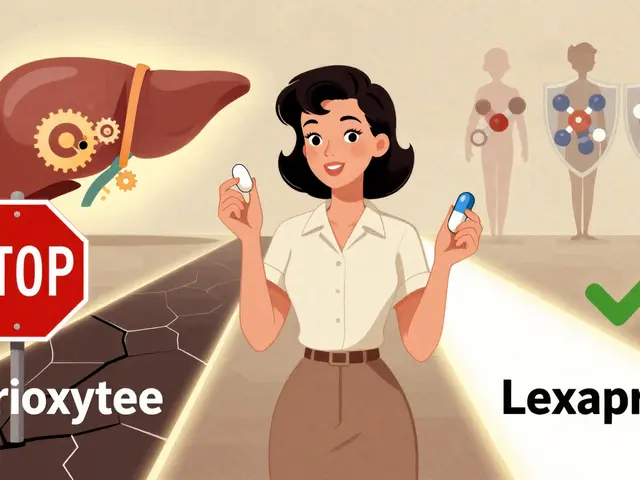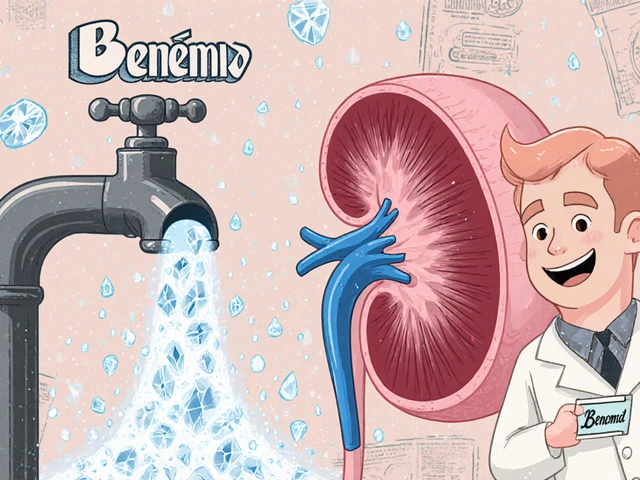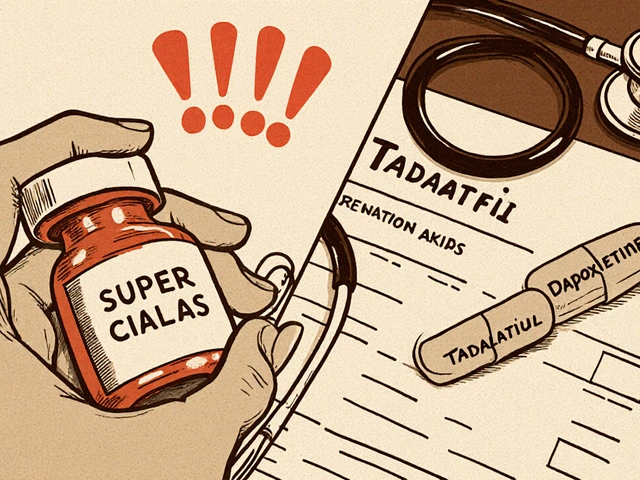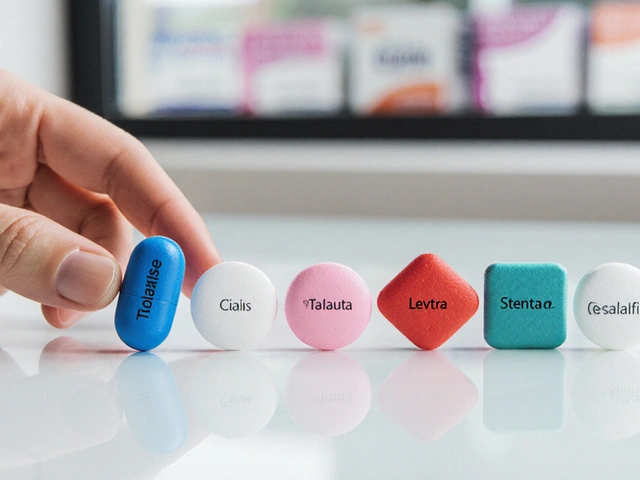BPH Medication Decision Tool
Find Your Best BPH Medication
Answer a few quick questions to see which medication might work best for your situation. This tool is based on clinical evidence from the article. Always consult your doctor before making treatment decisions.
Quick Takeaways
- Flomax (tamsulosin) is an alpha‑1 blocker that relaxes prostate smooth muscle, relieving urinary symptoms in BPH.
- Alfuzosin, silodosin and doxazosin are clinically similar alpha blockers but differ in selectivity, dosing and side‑effect profiles.
- Finasteride works through a different pathway (5‑alpha‑reductase inhibition) and is best for patients with larger prostates.
- Cost varies: generic tamsulosin is usually cheapest, while silodosin and brand‑only formulations can be more expensive.
- Choosing the right drug depends on symptom severity, prostate size, cardiovascular health and personal tolerance of side effects.
What Is Flomax (Tamsulosin)?
When you hear the name Flomax (Tamsulosin) is a selective alpha‑1A adrenergic receptor antagonist designed to relax the smooth muscle in the prostate and bladder neck. By targeting the A subtype, it minimizes impact on blood vessels, reducing the chance of low blood pressure compared with non‑selective alpha blockers. First approved by the FDA in 1997, the medication is now available as a generic, making it a common first‑line choice for benign prostatic hyperplasia (BPH) symptom relief.
Why Compare Alternatives?
Not everyone tolerates Flomax perfectly. Some patients report dizziness, ejaculatory issues or rare cardiac events. Others have conditions-like severe hypertension or a need for multiple daily doses-that make a different drug a better fit. By looking side‑by‑side at the most common alternatives, you can see which one aligns with your health profile and lifestyle.
Key Alternative Classes
The main competitors fall into two groups: other alpha‑1 blockers and 5‑alpha‑reductase inhibitors. Below you’ll find the most prescribed drugs in each group.
- Alfuzosin - a non‑selective alpha blocker with once‑daily dosing.
- Silodosin - highly selective for the alpha‑1A receptor, marketed for men who want to avoid blood‑pressure drops.
- Doxazosin - originally an antihypertensive, used off‑label for BPH, taken once daily.
- Terazosin - similar to doxazosin but with a slightly longer half‑life.
- Finasteride - a 5‑alpha‑reductase inhibitor that shrinks prostate tissue over months.
Effectiveness: Symptom Relief
Clinical trials consistently show that alpha blockers improve the International Prostate Symptom Score (IPSS) by 3‑5 points on average. Flomax, alfuzosin, silodosin and doxazosin all sit in that range, with no clear winner in short‑term studies (4-12 weeks). The distinction emerges with long‑term use and prostate size.
Finasteride, by contrast, reduces prostate volume by roughly 20 % after 6-12 months, leading to a slower but steadier IPSS improvement (≈4‑6 points). For men with a prostate larger than 40 g, adding finasteride to an alpha blocker often yields the best outcomes.
Side‑Effect Profiles
Side effects drive many switch decisions. Here’s a quick look at the most common complaints per drug.
| Medication | Typical Side Effects | Serious Risks |
|---|---|---|
| Flomax (Tamsulosin) | Dizziness, abnormal ejaculation, headache | Rare intra‑operative floppy iris syndrome (IFIS) |
| Alfuzosin | Dizziness, fatigue, nasal congestion | Hypotension (especially with antihypertensives) |
| Silodosin | Retrograde ejaculation, diarrhea | Minimal blood‑pressure effect |
| Doxazosin | Orthostatic hypotension, dizziness | First‑dose syncope |
| Terazosin | Dizziness, headache, nasal stuffiness | Severe hypotension if dose missed then taken |
| Finasteride | Decreased libido, erectile dysfunction | Potential for high‑grade prostate cancer (controversial) |
Notice how silodosin’s main bother is retrograde ejaculation, while the older non‑selective agents (doxazosin, terazosin) cause more blood‑pressure swings. If you’re on a heart‑medicine regimen, the selective profile of Flomax or silodosin usually feels safer.
Dosing Convenience
All alpha blockers discussed are taken once daily, but the timing varies. Flomax is best taken about an hour after the first meal, reducing the chance of orthostatic dizziness. Alfuzosin must be taken with food to improve absorption. Doxazosin and terazosin often start at a low dose taken at bedtime to blunt first‑dose hypotension. Silodosin can be taken with or without food, making it the most flexible.
Finasteride is a 5 mg tablet taken at the same time each day, regardless of meals. Because it works over months, patients need to be patient and maintain strict adherence.
Cost Considerations (2025 UK Market)
Generic tamsulosin (Flomax) typically costs £3‑£5 per month in the UK NHS formulary, making it the most budget‑friendly option. Alfuzosin generic is slightly higher at £5‑£7. Silodosin remains a brand‑only drug in most pharmacies, ranging from £15‑£20 per month. Doxazosin and terazosin are cheap antihypertensives, often below £4, but their off‑label BPH use may not be covered by insurance, leading to additional paperwork.
Finasteride 5 mg costs around £6‑£8 per month. Some men combine a low‑cost alpha blocker with finasteride for a total under £15, which is still cheaper than silodosin alone.
Drug Interactions and Contra‑indications
Alpha blockers can amplify the effect of other vasodilators (e.g., nitrates, certain antihypertensives), potentially causing severe hypotension. Flomax’s selectivity reduces this risk, but clinicians still advise monitoring.
Silodosin’s metabolizing enzyme CYP3A4 means strong inhibitors (ketoconazole, clarithromycin) can raise blood levels, while inducers (rifampin) may reduce efficacy.
Finasteride interacts with no major drug classes, but it should not be used in women of child‑bearing age due to risk of birth defects.
Choosing the Right Medication: A Simple Decision Tree
- If you need quick symptom relief and want the lowest cost, start with generic Flomax (tamsulosin).
- If you experience troublesome ejaculatory side effects, consider switching to silodosin - it spares blood pressure.
- If you have low blood pressure or are on multiple antihypertensives, alfuzosin or a low‑dose doxazosin taken at night can be safer.
- If your prostate is large (>40 g) and you’re comfortable waiting several months, add finasteride to an alpha blocker.
- If cost is a major barrier, avoid brand‑only silodosin and choose generic alfuzosin or doxazosin.
This flowchart isn’t a substitute for a doctor’s advice, but it helps you ask the right questions during your next appointment.
Real‑World Patient Stories
John, 68, from Manchester, tried Flomax for three months. He reported a 30 % reduction in nocturia but complained about “dry orgasms.” His urologist switched him to silodosin; the nocturia stayed low, and his sexual function returned to normal-though his monthly cost doubled.
Maria’s husband, Luis, 72, had hypertension and was already on an ACE inhibitor. He experienced dizziness on Flomax’s first dose. After a dosage tweak (taking it with breakfast) and a switch to alfuzosin taken with his evening meal, his blood pressure stabilized and urinary flow improved.
Final Thoughts
There’s no one‑size‑fits‑all answer. Flomax (tamsulosin) remains the go‑to for most men because of its balance of efficacy, tolerability and price. Alternatives like alfuzosin, silodosin, doxazosin, terazosin and finasteride each fill a niche-whether you need a different side‑effect profile, a cheaper pill, or long‑term prostate volume reduction.
Discuss your prostate size, heart health, medication list and budget with your healthcare provider. A small adjustment can mean big gains in comfort and quality of life.
Frequently Asked Questions
How long does it take for Flomax to start working?
Most men notice improvement in urinary flow within 3‑5 days, but the full effect may take up to two weeks.
Can I take Flomax with blood‑pressure medication?
Yes, but start at the lowest dose and monitor for dizziness. Flomax’s selectivity makes severe drops less likely than with non‑selective alpha blockers.
What is retrograde ejaculation and which drug causes it most?
Retrograde ejaculation is when semen travels backward into the bladder instead of out through the penis. Silodosin has the highest incidence, followed by Flomax and alfuzosin.
Is finasteride safe for long‑term use?
Clinical data show finasteride is safe for many years, but men should have annual prostate exams because of a debated link to high‑grade prostate cancer.
Do I need to stop Flomax before eye surgery?
Yes. Flomax can cause intra‑operative floppy iris syndrome (IFIS). Surgeons usually ask patients to discontinue it at least a week before cataract surgery.







Write a comment
Your email address will be restricted to us